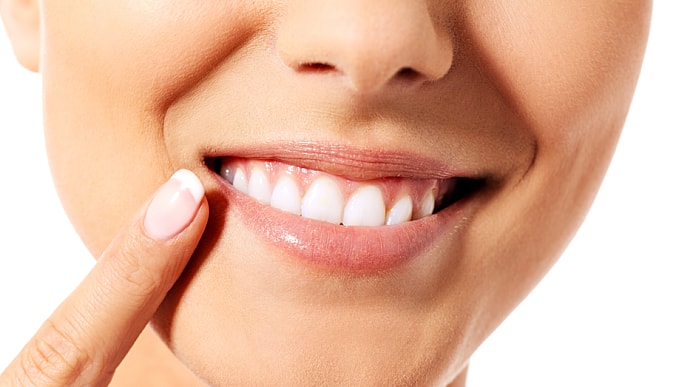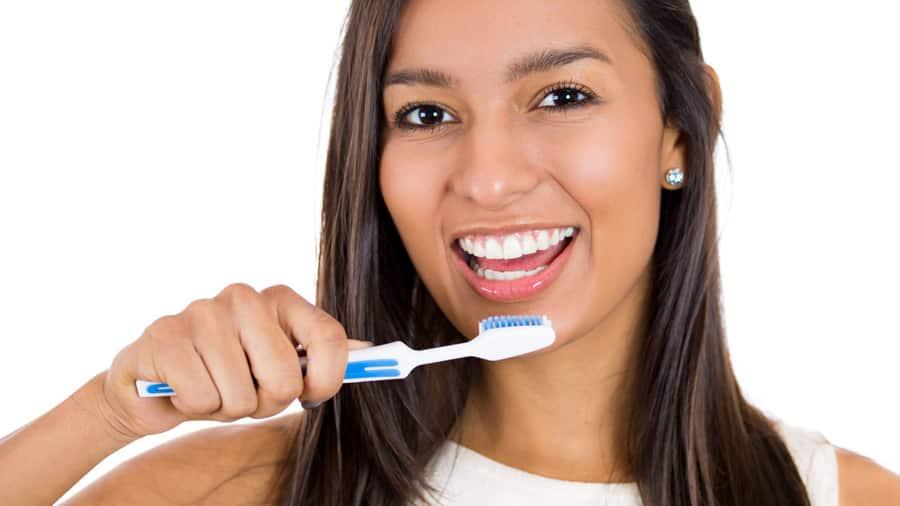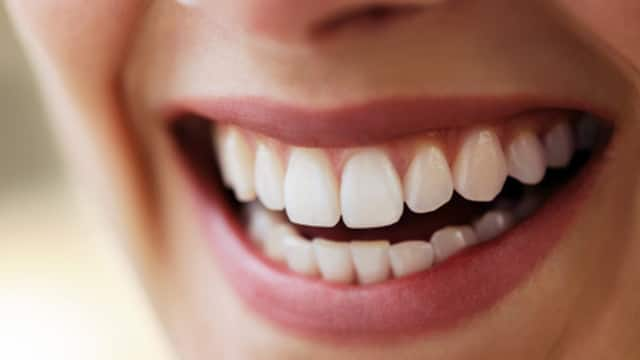While baking soda is commonly believed to whiten teeth, the scientific evidence supporting its efficiency remains uncertain. Keep reading to uncover the truth behind baking soda's effectiveness in whitening teeth. We will delve into the existing evidence, assess its advantages and disadvantages, and explore the other alternative options available for achieving a brighter smile.
Is Baking Soda Good For Teeth Whitening?
Baking soda is a common household product known for its many uses. It is known to get rid of odours and clean various surfaces, including carpets. One can also find baking soda in many toothpaste brands and teeth-whitening products. But is baking soda good for teeth whitening? It is known for its abrasive properties that scrub away stains from tea or coffee.
A 2012 study found that toothpaste with baking soda makes teeth whiter and removes stains. However, you need to be careful as using too much baking soda could hurt your teeth by wearing away the protective outer layer, called enamel. So, while baking soda can help your smile look better for a short time, using it too much or for a long time might not be a good idea for keeping your teeth white.
Does Baking Soda Work to Whiten Your Teeth?
The answer to the question of whether baking soda whitens teeth lies in its mild abrasiveness. Baking soda, also known as sodium bicarbonate, is a mild abrasive. When mixed into a paste with water, it can release free radicals that break down stain-causing molecules on the tooth enamel.
Although further studies are needed, cleaning teeth with baking soda or using toothpaste with baking soda as an ingredient may be appropriate for people at high risk of developing dental erosion. This is because it has lower abrasive levels and can minimise abrasive wear on softened or eroded dental surfaces.
Advantages And Disadvantages of Baking Soda For Teeth Whitening
Using baking soda for teeth whitening has both upsides and downsides. While many consider baking soda for its natural and affordable approach to brightening smiles, it is crucial to understand both its benefits and drawbacks. Below are the advantages and disadvantages of baking soda teeth whitening.
Advantages
Baking soda is known to offer several benefits for oral health, making it a common choice among individuals seeking natural oral care solutions.
Low abrasivity: Baking soda dentifrices, due to their mild abrasiveness, help scrub away surface stains caused by coffee, tea, and other substances.
Gingival health: In gingival health, baking soda is considered beneficial due to its antibacterial properties and ability to disrupt biofilms.
Plaque activity: Baking soda is known for reducing the acidity of plaque fluids and neutralising plaque acids.
Disadvantages
While baking soda dentifrices offer several advantages, it is important to consider potential drawbacks as well.
Teeth sensitivity: Frequent use of baking soda can erode tooth enamel, exposing the underlying dentin and leading to increased teeth sensitivity.
Gum irritation: Overuse or using baking soda aggressively can cause gum irritation, mostly due to its abrasive nature.
Enamel Damage: Frequent and aggressive brushing with baking soda can lead to enamel damage.
Teeth Whitening Alternatives
When it comes to achieving a brighter smile, there are various alternatives available over the counter to consider beyond baking soda. While baking soda has its merits, exploring alternative teeth whitening methods can provide a comprehensive approach to dental care. Here are some effective alternatives to consider:
Teeth Whitening Toothpaste
There are two main types of teeth whitening toothpastes. Unlike regular toothpaste, the first type contains mild abrasives that gently scrub the tooth's surface and help in surface stain removal. Take Visible White Whitening Toothpaste, for example; it starts whitening your teeth in 1 week. This toothpaste contains whitening accelerators that help remove stains like those from tea, coffee, or wine by gently removing them and polishing the tooth surface, all while protecting the enamel.
Teeth Whitening Serum
For those seeking immediate results, a whitening serum for teeth is an excellent choice. The *Colgate Visible White Purple Serum, for example, provides an instant whitening boost from the first application. It works on the science of color correction technology, where its ultimate purple formula neutralizes yellow tones, making it a quick and effective way to enhance your smile's brightness*.
*for temporary efficacy.
*vs brushing with Colgate non whitening toothpaste alone.
Teeth Whitening Strips
Whitening strips usually contain a pre-applied serum on the strip with an active ingredient that gently bleaches the teeth. While they are effective for removing stains from teeth at home, it is important to know that whitening strips might cause sensitivity as a side effect due to the presence of hydrogen peroxide or carbamide peroxide. Therefore, it is crucial to choose the right strip by carefully checking the ingredients. You may also consult a healthcare professional before choosing a whitening strip to get the right guidance.
Teeth Whitening Pens
Whitening pens offer a convenient and portable method for teeth whitening, typically containing whitening agents like hydrogen peroxide or carbamide peroxide. When applied directly to the teeth after brushing, the gel is left on for a specified time to lighten stains gradually. However, not all teeth whitening pens available in the Indian market are proven to be effective, and some may contain stronger whitening agents than toothpaste, requiring careful application to avoid potential side effects. Consulting a dentist for recommendations can ensure the effective and safe use of a whitening pen.
While baking soda for teeth whitening can offer temporary improvements in tooth appearance by removing tooth stains, its abrasive nature and potential for enamel erosion highlight the importance of cautious use. Moreover, alternative teeth whitening methods, such as whitening toothpaste, strips, and pens, provide better options for those seeking a brighter smile. These alternatives not only address tooth stains but also contribute to overall oral hygiene by aiding in plaque removal and promoting dental health.
Additionally, consulting with a dental professional can provide personalised guidance on the most suitable whitening treatment, ensuring effective results while safeguarding against issues like enamel erosion, tooth decay, and bad breath.
Frequently Asked Questions
1. How fast does baking soda whiten teeth?
How long it takes baking soda for teeth to whiten depends on the severity of the stains. Generally, it may take about two weeks of daily use. However, it should be used with caution. If you are looking for a quick fix, you may opt for professional teeth whitening or other alternatives like whitening toothpaste, a strip, or a pen.
2. Can I mix baking soda with my toothpaste?
While some may consider mixing baking soda with regular fluoride toothpaste, its effectiveness is uncertain. Baking soda toothpastes are available on the market for those seeking their benefits. However, consulting a dental professional is advised for personalised whitening recommendations.
3. Is baking soda good for a bad tooth?
When considering the question is baking soda good for teeth, one may consider the benefits of baking soda for teeth. Baking soda helps in limiting plaque buildup by neutralising plaque acids, preventing tooth decay, and facilitating enamel remineralization. Moreover, its cleaning properties effectively remove stains and protect against plaque formation.
4. Is baking soda safe for teeth whitening?
Baking soda has been considered a smart choice to whiten your teeth, but it is not a fix-all for your dental health. However, it is essential to use baking soda in moderation and avoid excessive scrubbing, as its abrasive nature can potentially damage the enamel over time. Always consult with your dentist before starting any teeth whitening treatment to ensure it is suitable for your oral health needs.
This article is intended to promote understanding of and knowledge about general oral health topics. It is not intended to be a substitute for professional advice, diagnosis or treatment. Always seek the advice of your dentist or other qualified healthcare provider with any questions you may have regarding a medical condition or treatment.
ORAL HEALTH QUIZ
What's behind your smile?
Take our Oral Health assessment to get the most from your oral care routine
ORAL HEALTH QUIZ
What's behind your smile?
Take our Oral Health assessment to get the most from your oral care routine













